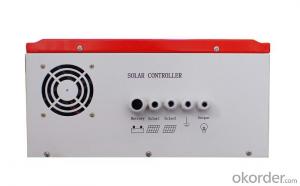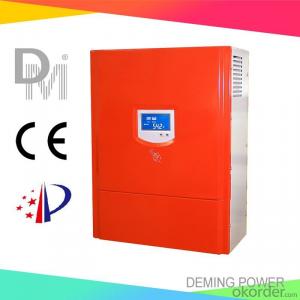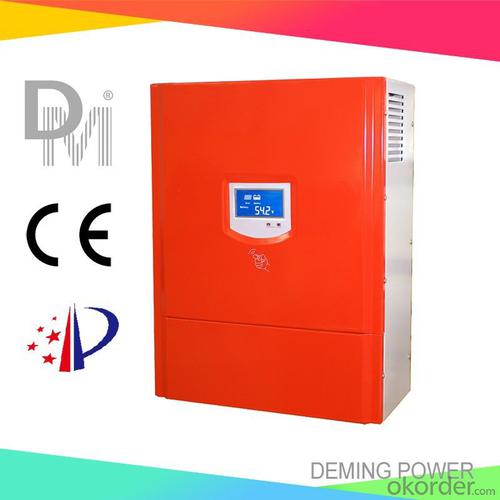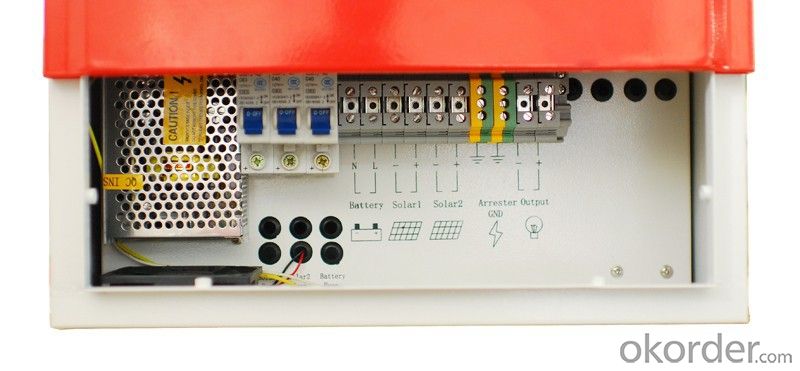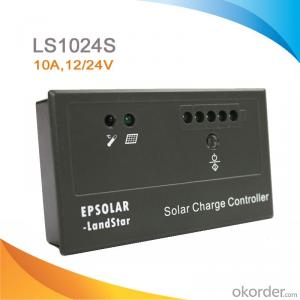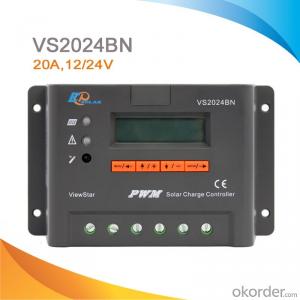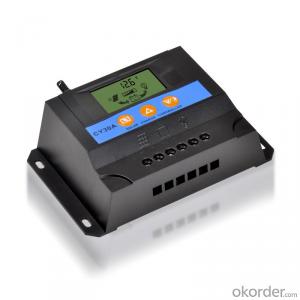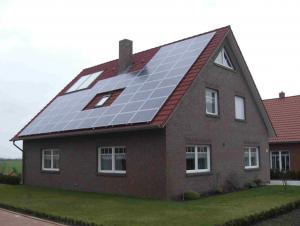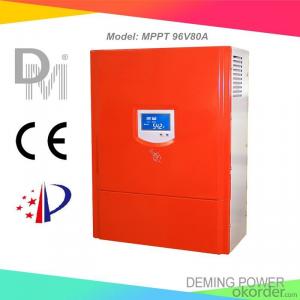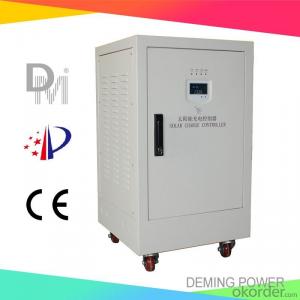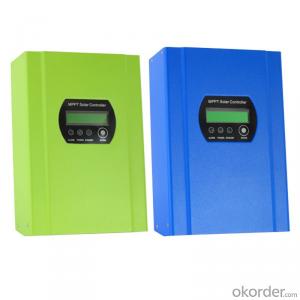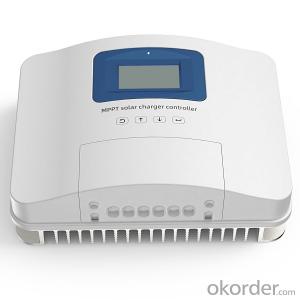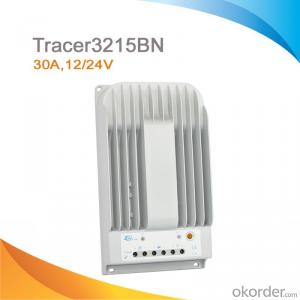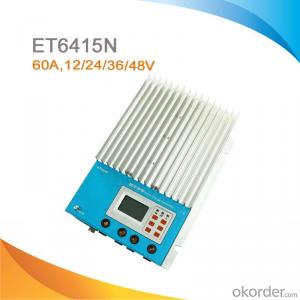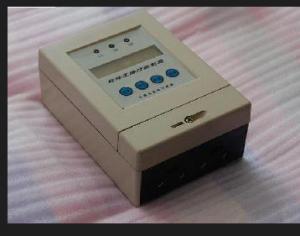2 Solar Charge Controllers MPPT Solar Charge Controller 96V 30A with Best Price for Solar Power System
- Loading Port:
- Qingdao
- Payment Terms:
- TT or LC
- Min Order Qty:
- 1 PCS
- Supply Capability:
- 1000 PCS/month
OKorder Service Pledge
OKorder Financial Service
You Might Also Like
Properties of the solar charge controller
1. Design for off-grid solar power system.
2. Applicable to different kinds of batteries.
3. Modular design with simple structure and easy maintenance.
4. LCD display: Solar panel current, solar panel voltage, solar panel power, battery group voltage, charge current.
Technical parameters of the solar charge controller
Model | 96V30A | |||||
Battery group rated voltage | 96Vdc | |||||
PV Rated current | 30A | |||||
PV open circuit voltage | 400V | |||||
PV Max. power | 2880Wp | |||||
Input PV module road number | 1 | |||||
Function | MPPT charge mode, auto stop charge, auto recharge voltage; Protection: connecting contrary, over current, short circuit, over heat etc. | |||||
Display mode | LCD | |||||
Display content | solar panel voltage, solar panel current, solar panel power, battery voltage, charge current | |||||
MPPT DC voltage rang | 80-116Vdc | |||||
Floating Charge Voltage (adjustable) | 110Vdc | |||||
Stop charge voltage | 116Vdc±1% | |||||
Recharge voltage | 108V±1% | |||||
Voltage drop between PV and battery | 1.5V | |||||
Max itself power consumption | 100mA-150mA | |||||
Work environment temperature | -30-60°C | |||||
Relative humidity | 90% No condensation | |||||
Applicable altitude | 3000m The rated power should be reduced when it is higher than 2000m | |||||
Noise (1m) | 40dB | |||||
Degree of protection | IP20(Indoor) | |||||
Cooling method | Forced air cooling | |||||
*Communication interface (optional) | RS485/USB/GPRS/Ethernet | |||||
*Temperature compensation(optional) | -4mv/°C/2V,-35°C~+80°C,Accuracy:±1°C | |||||
Product size (mm) | 480*370*160mm | |||||
Product Weight(kg) | 12kg | |||||
*Above parameter only for reference. Could be custom made to user specifications.
Image
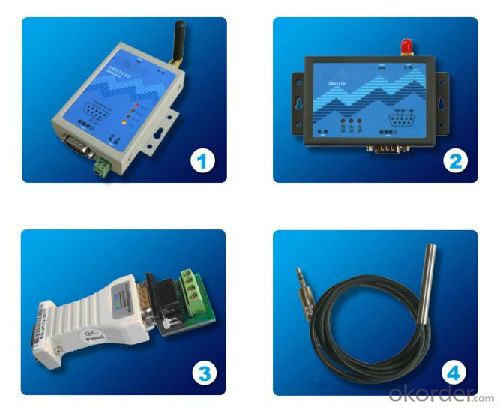
FAQ
Q1:Can we visit your factory? A1:Sure,welcome at any time,seeing is believing. Q2:How to guarantee the Quality of the products? A2:We have established the international advanced Quality management system,every link from raw material to final product we have strict Quality test;We resolutely put an end to unQualified products flowing into the market. At the same time, we will provide necessary follow-up service assurance.
- Q: What is the role of a solar controller in preventing damage to the solar panels from lightning strikes?
- The role of a solar controller in preventing damage to solar panels from lightning strikes is to divert the excess electrical energy generated by the lightning strike away from the panels. It does this by providing a low-impedance path for the lightning current to follow, effectively bypassing the panels and reducing the risk of damage. Additionally, some solar controllers also offer surge protection features to further safeguard the panels from voltage spikes caused by lightning strikes.
- Q: Can a solar controller be used with solar-powered indoor religious institutions?
- Yes, a solar controller can be used with solar-powered indoor religious institutions. A solar controller helps regulate and optimize the charging of batteries in a solar power system, ensuring efficient energy storage and usage. Whether the religious institution is indoors or outdoors, a solar controller can effectively manage the energy generated by solar panels and enable the use of clean and renewable energy for powering various electrical appliances and systems within the establishment.
- Q: Can a solar controller be used with a solar-powered chicken coop?
- Yes, a solar controller can be used with a solar-powered chicken coop. A solar controller helps regulate the charging and discharging of batteries in a solar system, ensuring optimal performance and preventing overcharging. In a solar-powered chicken coop, the solar controller can be used to manage the power generated by the solar panels and store it in batteries for use during cloudy days or at night, providing a reliable source of electricity for the coop's lighting, heating, or other electrical needs.
- Q: How does a solar controller handle variations in load power requirements?
- The solar controller continuously monitors the power required by the load and adjusts the energy flow from the solar panels accordingly, handling variations in load power requirements. In the event of an increase in load power requirement, the solar controller increases the energy flow from the solar panels to meet the demand. This is achieved by raising the duty cycle of the controller, allowing more energy to be transferred from the panels to the load. On the other hand, if the load power requirement decreases, the solar controller decreases the energy flow from the solar panels to prevent overcharging the batteries or wasting excess energy. This is done by reducing the duty cycle, limiting the amount of energy transferred from the panels to the load. Additionally, solar controllers utilize various algorithms and control mechanisms to optimize the balance between energy generation and load consumption. These algorithms may include maximum power point tracking (MPPT) to ensure the solar panels operate at their most efficient point, as well as voltage and current regulation to safeguard the batteries and load from potential damage. Overall, the solar controller has a vital role in efficiently managing the power flow between the solar panels and the load, ensuring that variations in load power requirements are effectively handled.
- Q: Can a solar controller be used with solar-powered indoor entertainment systems?
- No, a solar controller is not necessary for solar-powered indoor entertainment systems as they do not require the same level of energy management and regulation as outdoor solar systems.
- Q: Can a solar controller handle power surges from the utility grid?
- No, a solar controller is not designed to handle power surges from the utility grid. Its primary function is to regulate and control the flow of power between the solar panels and the battery bank, ensuring optimal charging and preventing overcharging or damage to the battery. To protect against power surges from the utility grid, additional surge protection devices or equipment should be installed in the electrical system.
- Q: Can a solar controller be used with a solar-powered remote cabin or cottage?
- Yes, a solar controller can be used with a solar-powered remote cabin or cottage. A solar controller regulates the flow of electricity from the solar panels to the batteries, preventing overcharging and ensuring the batteries are charged efficiently. It is an essential component for managing and optimizing the solar power system in a remote cabin or cottage.
- Q: What is the role of a solar controller in preventing battery thermal runaway?
- A solar controller plays a crucial role in preventing battery thermal runaway by regulating the charging process and maintaining appropriate voltage levels. It ensures that the battery is charged within safe limits and prevents overcharging, which can lead to excessive heat buildup and potential thermal runaway. Additionally, some solar controllers have built-in temperature sensors that monitor battery temperature and adjust the charging parameters accordingly, further reducing the risk of thermal runaway.
- Q: What is the solar controller system voltage? Solar controller battery terminal connected to 12V battery, the load side can be directly connected to the 12V DC lamp?
- The system voltage is the voltage you use the battery, such as 12V or 24V. According to your overall configuration, if your battery is a working voltage of 18V, then the system voltage can only use 12V, 36V is used on the 24V.
- Q: What is the purpose of the battery over-discharge protection feature on a solar controller?
- The purpose of the battery over-discharge protection feature on a solar controller is to prevent the battery from being discharged beyond a safe level. This feature helps to prolong the battery's lifespan and ensures that it remains in a healthy condition for optimal performance.
Send your message to us
2 Solar Charge Controllers MPPT Solar Charge Controller 96V 30A with Best Price for Solar Power System
- Loading Port:
- Qingdao
- Payment Terms:
- TT or LC
- Min Order Qty:
- 1 PCS
- Supply Capability:
- 1000 PCS/month
OKorder Service Pledge
OKorder Financial Service
Similar products
Hot products
Hot Searches
Related keywords
